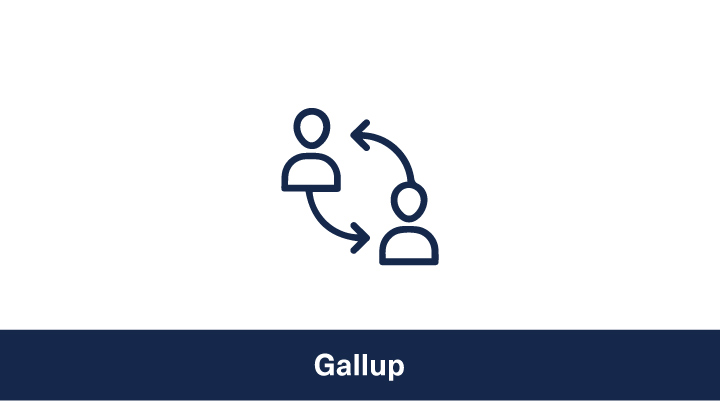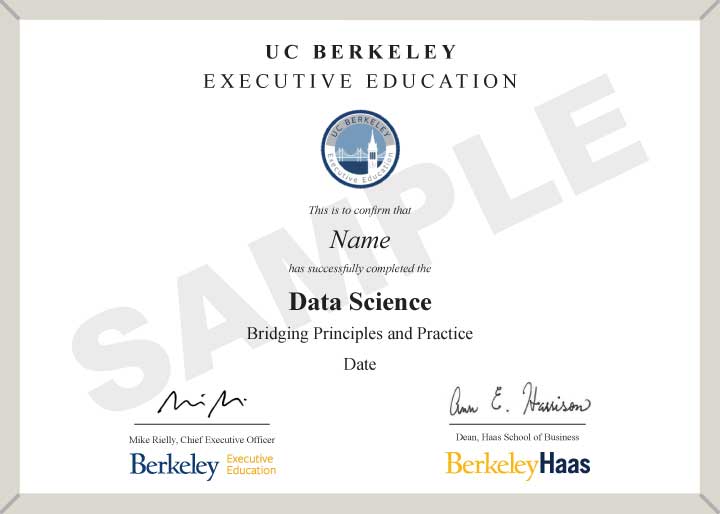The benefit of learning together with your friend is that you keep each other accountable and have meaningful discussions about what you're learning.

Courtlyn
Promotion and Events Specialist
TBD
10 weeks, online
6-8 hours per week
Participants report that enrolling in a program with colleagues fosters collaborative learning and amplifies their impact.
Please provide your details to get more information about the group-enrollment pricing.
The benefit of learning together with your friend is that you keep each other accountable and have meaningful discussions about what you're learning.

Courtlyn
Promotion and Events Specialist
Enrolling in this program is the first step in your journey to alumni benefits.
Learn More
Don’t let a data-driven organization overtake you. Become a data organization too. No matter the industry, every organization must be in the data business.
According to NewVantage Partners’ 2021 survey of senior executives, 96% said AI and big data had produced successful business outcomes, up more than 25% over the previous year. Still, only 41% say they are competing on analytics, and fewer than a quarter say their organizations have built a data-driven culture. The challenge to realizing the potential of big data lies not in the technology itself, but rather in the transformation of teams, culture, and processes.
In this program, prepare to dive right into that transformation by getting dirty in the data. Data Science: Bridging Principles and Practice provides a foundational understanding of what data science and analytics is all about. By the end of this program, you will be able to work effectively with data teams to drive successful outcomes for your organization.
In this program, you will be introduced to the basics of statistics and analytics in order to build a foundation in data science. You will acquaint yourself with the tools of analytics, explore the business applications of data concepts and tools, and develop the language and skills to work effectively with your data team. By the end of the program, you will be prepared to do the following:
This program is for mid-career managers who want to upskill, C-suite professionals that make impactful organizational decisions, and executives who want to develop their career in a fast-growing field.
While there are no formal prerequisites such as coding knowledge, having an aptitude for quantitative concepts is important.
As pre-term work and in week 1, there will be a review of basic mathematical and statistical concepts such as mean, standard deviation, graphs, histograms, and linear and logarithmic functions. In addition, there will be a weekly 'prep session' to introduce key concepts from the next module that participants may want a refresher on. To gain true literacy in data science, be prepared to get dirty in the data and embrace some math and stats. We'll fully support you along the way.
As you work through the hands-on modules, you will gain meaningful business insights from the data and example cases derived from a broad sampling of industries.
We’ll introduce the foundational concepts behind data science and analytics before exploring the fundamentals of data.
Learn the definitions of key survey terms as well as methods that use sampling to analyze the pros and cons of business decisions through the exploration of sampling, type I and type II errors, and control limits.
Making data-driven business decisions relies on well-articulated hypotheses that lend themselves to statistical tests. We’ll cover the foundations of this approach, including statistical comparisons, confidence intervals, and margins of error.
We’ll explore the most common linear and curved patterns and understand different ways to fit data to linear models. A central application will be understanding market demand, price setting, and elasticities.
Simple regression analyses are at the heart of more elaborate data-driven business decision making. We’ll focus on understanding how these models are used, the assumptions that make their use valid, and how to leverage these models to make better business decisions.
Build on the basics to define the multiple regression model and explore different use cases.
We’ll demystify machine learning by mastering the fundamentals and studying different applications.
With the fundamentals and some of the most common tools under our belts, we’ll dive deep into the competencies that define effective data science teams and show you how to build a data-driven culture in your organization. We will stress common pitfalls and strategies to work effectively with data scientists.
We’ll introduce the foundational concepts behind data science and analytics before exploring the fundamentals of data.
Simple regression analyses are at the heart of more elaborate data-driven business decision making. We’ll focus on understanding how these models are used, the assumptions that make their use valid, and how to leverage these models to make better business decisions.
Learn the definitions of key survey terms as well as methods that use sampling to analyze the pros and cons of business decisions through the exploration of sampling, type I and type II errors, and control limits.
Build on the basics to define the multiple regression model and explore different use cases.
Making data-driven business decisions relies on well-articulated hypotheses that lend themselves to statistical tests. We’ll cover the foundations of this approach, including statistical comparisons, confidence intervals, and margins of error.
We’ll demystify machine learning by mastering the fundamentals and studying different applications.
We’ll explore the most common linear and curved patterns and understand different ways to fit data to linear models. A central application will be understanding market demand, price setting, and elasticities.
With the fundamentals and some of the most common tools under our belts, we’ll dive deep into the competencies that define effective data science teams and show you how to build a data-driven culture in your organization. We will stress common pitfalls and strategies to work effectively with data scientists.
Note: In order to help you explore some of the hands-on techniques that lead directly to making better data-driven decisions, there will be two weeklong learning labs that provide an opportunity to dig deeper into the data. This extends the program to a total of 10 weeks.
Download BrochureDuring this ten-week online journey, you’ll connect directly with UC Berkeley Executive Education's faculty, industry leaders and peers from every corner of the globe. Taking a rigorous, hands-on approach, you’ll analyze data sets using Jupyter Notebook, an interactive open-source platform we will use for computational analysis. While the curriculum is pre-determined, this is an agile learning experience and there may be dynamic opportunities that present themselves based on real-world happenings.
UC Berkeley Executive Education’s faculty members have built strong relationships with industry, including many of the top organizations in and around Silicon Valley. The program's content is either inspired by or directly derived from research and applications from companies that include:





Note: All product and company names are trademarks™ or registered® trademarks of their respective holders. Their use does not imply any affiliation with or endorsement by them.
Since every company is a data company and every organization can benefit from improving its data literacy, we will explore examples from a range of industries, including:





Enrolling in the Data Science (Online) program can become your first step toward pursuing the UC Berkeley Executive Education Certificate of Business Excellence (COBE). The Certificate of Business Excellence gives individuals the opportunity to acquire and hone new skills and do it on a timeline that works with your busy schedule. Participants will earn a mark of distinction with certification from a world-class university, and enjoy the flexibility of completing the program in up to three years.
Learn more about the program and associated alumni benefits here.
Networking and events
Exclusive Berkeley Resources
News and communication
Note: All benefits subject to change.

Get recognized! Upon successful completion of the program, UC Berkeley Executive Education grants a verified digital certificate of completion to participants. Participants must complete 80% of the required activities including a capstone project (if any) to obtain the certificate of completion. This program also counts toward a Certificate of Business Excellence.
Successful completion of this program fulfills two curriculum days (minimum requirement of 17 curriculum days) towards the UC Berkeley Certificate of Business Excellence (COBE).
Learn more on how it works here.
Note: This program results in a digital certificate of completion and is not eligible for degree credit/CEUs. After successful completion of the program, your verified digital certificate will be emailed to you in the name you used when registering for the program. All certificate images are for illustrative purposes only and may be subject to change at the discretion of UC Berkeley Executive Education.

After reviewing the information on the program landing page, we recommend you submit the short form above to gain access to the program brochure, which includes more in-depth information. If you still have questions on whether this program is a good fit for you, please email learner.success@emeritus.org, and a dedicated program advisor will follow-up with you very shortly.
Some programs do have prerequisites, particularly the more technical ones. This information will be noted on the program landing page, as well as in the program brochure. If you are uncertain about program prerequisites and your capabilities, please email us at the ID mentioned above.
Note that, unless otherwise stated on the program web page, all programs are taught in English and proficiency in English is required.
More than 50 percent of our participants are from outside the United States. Class profiles vary from one cohort to the next, but, generally, our online certificates draw a highly diverse audience in terms of professional experience, industry, and geography — leading to a very rich peer learning and networking experience.
Check back to this program web page or email us to inquire if future program dates or the timeline for future offerings have been confirmed yet.
Each program includes an estimated learner effort per week. This is referenced at the top of the program landing page under the Duration section, as well as in the program brochure, which you can obtain by submitting the short form at the top of this web page.
We have designed this program to fit into your current working life as efficiently as possible. Time will be spent among a variety of activities including:
The program is designed to be highly interactive while also allowing time for self-reflection and to demonstrate an understanding of the core topics through various active learning exercises. Please email us if you need further clarification on program activities.
More than 300,000 learners across 200 countries have chosen to advance their skills with Emeritus and its educational learning partners. In fact, 90 percent of the respondents of a recent survey across all our programs said that their learning outcomes were met or exceeded.
All the contents of the course would be made available to students at the commencement of the course. However, to ensure the program delivers the desired learning outcomes the students may appoint Emeritus to manage the delivery of the program in a cohort-based manner the cost of which is already included in the overall course fee of the course.
A dedicated program support team is available 24/5 (Monday to Friday) to answer questions about the learning platform, technical issues, or anything else that may affect your learning experience.
Peer learning adds substantially to the overall learning experience and is an important part of the program. You can connect and communicate with other participants through our learning platform.
Each program includes an estimated learner effort per week, so you can gauge what will be required before you enroll. This is referenced at the top of the program landing page under the Duration section, as well as in the program brochure, which you can obtain by submitting the short form at the top of this web page. All programs are designed to fit into your working life.
This program is scored as a pass or no-pass; participants must complete the required activities to pass and obtain the certificate of completion. Some programs include a final project submission or other assignments to obtain passing status. This information will be noted in the program brochure. Please email us if you need further clarification on any specific program requirements.
Upon successful completion of the program, you will receive a smart digital certificate. The smart digital certificate can be shared with friends, family, schools, or potential employers. You can use it on your cover letter, resume, and/or display it on your LinkedIn profile.
The digital certificate will be sent approximately two weeks after the program, once grading is complete.
No, only verified digital certificates will be issued upon successful completion. This allows you to share your credentials on social platforms such as LinkedIn, Facebook, and Twitter.
UC Berkeley Center for Executive Education, dba Berkeley Executive Education, is a California nonprofit organization formed for the purpose of operating executive education programs in support of UC Berkeley and the Haas School of Business.
No, there is no alumni status granted for this program. In some cases, there are credits that count toward a higher level of certification. This information will be clearly noted in the program brochure.
You will have access to the online learning platform and all the videos and program materials for 12 months following the program start date. Access to the learning platform is restricted to registered participants per the terms of agreement.
Participants will need the latest version of their preferred browser to access the learning platform. In addition, Microsoft Office and a PDF viewer are required to access documents, spreadsheets, presentations, PDF files, and transcripts.
Yes, the learning platform is accessed via the internet, and video content is not available for download. However, you can download files of video transcripts, assignment templates, readings, etc. For maximum flexibility, you can access program content from a desktop, laptop, tablet, or mobile device.
Video lectures must be streamed via the internet, and any livestream webinars and office hours will require an internet connection. However, these sessions are always recorded, so you may view them later.
Yes, you can register up until seven days past the published start date of the program without missing any of the core program material or learnings.
The program fee is noted at the top of this program web page and usually referenced in the program brochure as well.
Yes, you can do the bank remittance in the program currency via wire transfer or debit card. Please contact your program advisor, or email us for details.
Yes! Please email us with the details of the program you are interested in, and we will assist you.
Please email us your invoicing requirements and the specific program you’re interested in enrolling in.
Yes, the flexible payment option allows a participant to pay the program fee in installments. This option is made available on the payment page and should be selected before submitting the payment.
Please connect with us via email for assistance.
Emeritus collects all program payments, provides learner enrollment and program support, and manages learning platform services.
For the program refund and deferral policy, please click the link here.